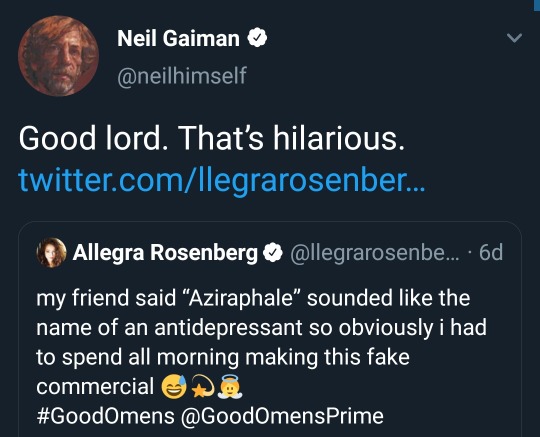Note
What’s your favourite line from good omens?
The invisible and unbreakable one that joins Crowley and Aziraphale.
13K notes
·
View notes
Text
One of the funniest bits of the Bark Ruffalo BAFTA sketch to me was how David Tennant kept asking people in the audience if they were good with dogs and they all reached to take the dog and David had to actively pull away from them because c'mon - when David Tennant offers you a puppy YOU SAY YES.
#david tennant#bafta#bafta awards#bafta 2024#michael sheen#michael and david#ineffable husbands#ineffable spouses#bark ruffalo#baftas
912 notes
·
View notes
Video
"All married people"
youtube
Given the nature of the Internet, you may need this one day. It’s Amanda Palmer doing the “You were right” dance.
(What, you don’t do the “You were right” dance? I thought all married people did the “you were right” dance. Probably you are not married.)
#gos2#season 2#you were right#the apology dance#neil gaiman#good omens season 2#good omens s2#bts#good omens#ineffable husbands
995 notes
·
View notes
Text
Really nice breakdown between these parallel scenes!
The offers that can't be refused: the Metatron-Beelzebub parallels.
Because people keep telling Crowley said no, Aziraphale said yes. Oh, God, give me strength.
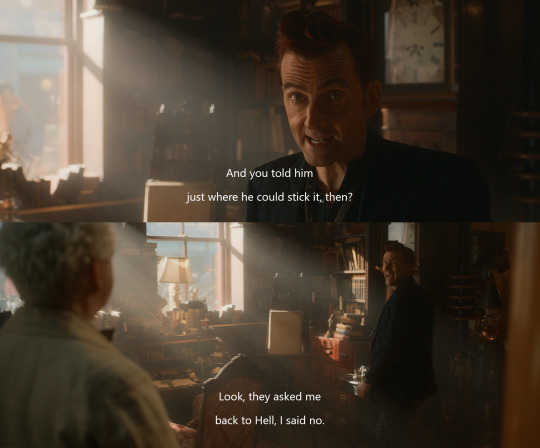
Crowley said he rejected Hell's offer, but did he? Let's compare the Beelzebub's and Metatron's methods. Let's find the parallels between the scenes.
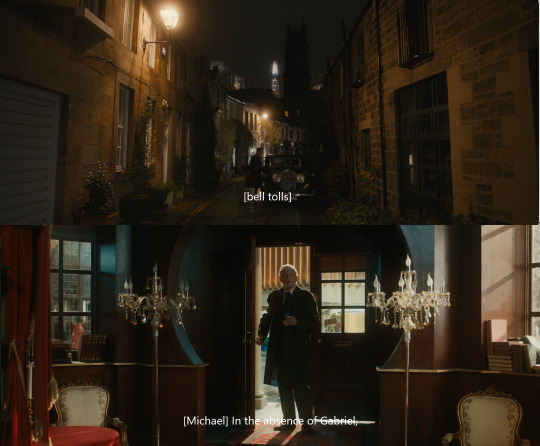
The appearance of the superiors is accompanied by bell ringing in both cases.
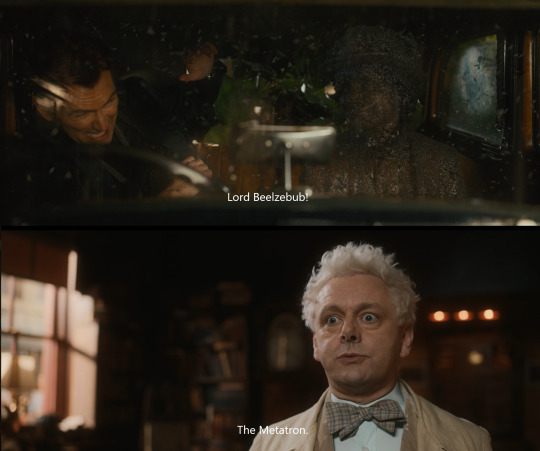
Crowley and Aziraphale are unpleasantly surprised, they exclaim their superiors' names. Why would such high-ranking bosses personally visit a traitors' hideout?
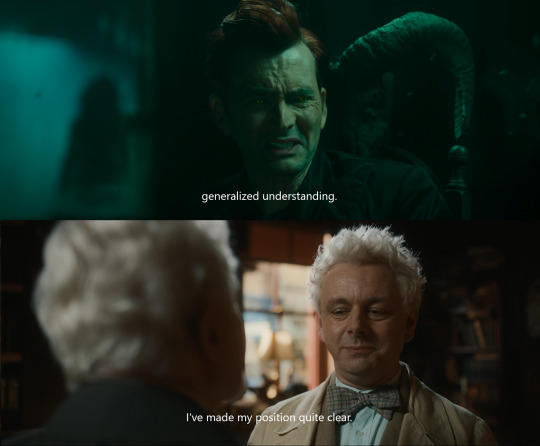
They remind about the arrangement with their superiors.
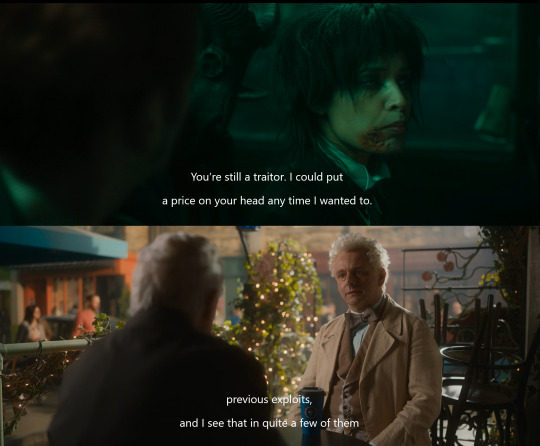
The threats: the direct one from Hell, the veiled one from Heaven.
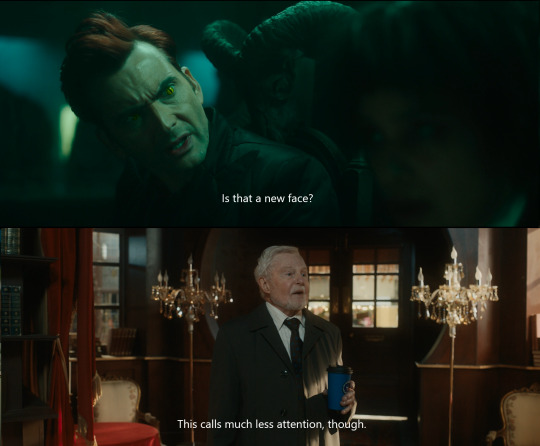
The change of guises.
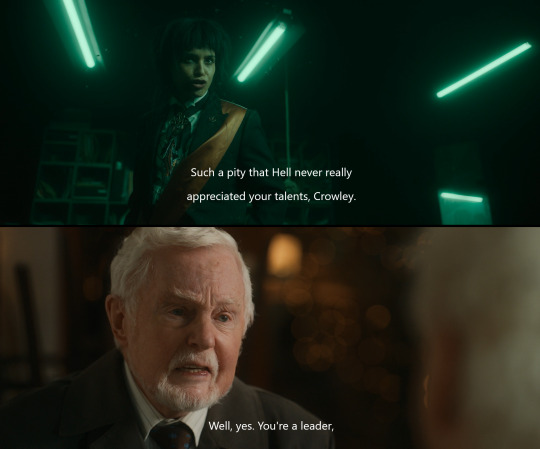
The flattery.
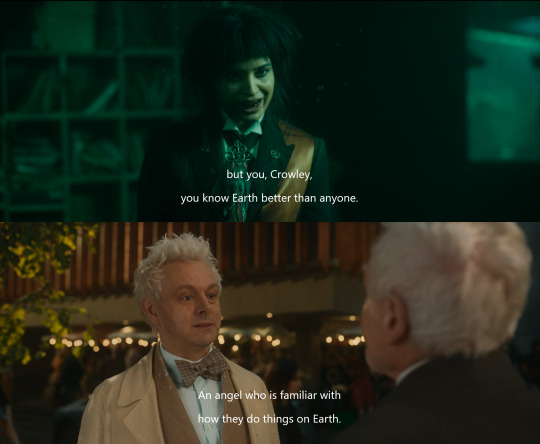
The knowledge of the Earth as the deciding factor for their choices.
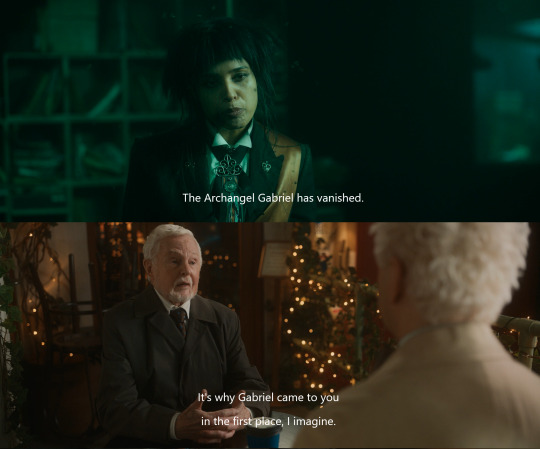
The mentions of Gabriel. It's logical for the conversation with Beelzebub, because the Prince's of Hell motives are already clear. Crowley was summoned for the purpose of finding their beloved Archangel.
What is the reason the Metatron mentions him? And as a benchmark for assessing Aziraphale's actions. From the point of view of the Voice's of God manipulative art, one can understand why. Aziraphale cannot be evaluated on the Michael or Uriel scale, because he himself considers them as bad angels.

And finally, the position offers. Crowley nodds while looking at Beelzebub, Aziraphale says he don't want to go to Heaven.
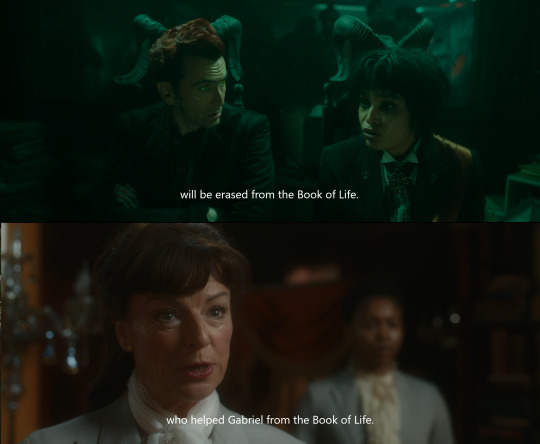
Bonus: the threats of erasing from the Book of Life. Crowley rushes to Aziraphale intending to save him. And Aziraphale having received additional threats from the Metatron tries to reproduce their conversation for Crowley.
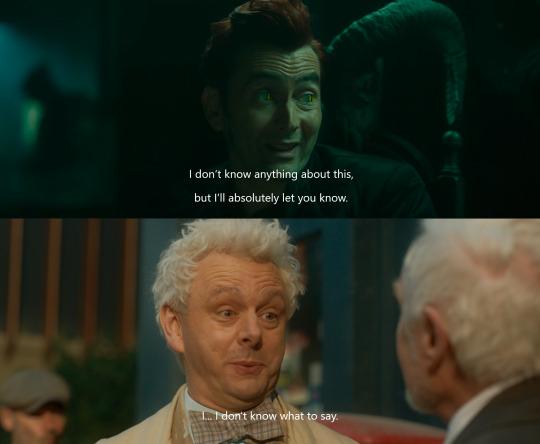
They're the same, Your Honour!
Crowley has refused to be a Duke of Hell just like Aziraphale has agreed to be a Supreme Archangel. Neither of them have responded yes or no.
It's clear this demon lied to Beelzebub, but his angel is also very experienced in this matter. And Aziraphale is accused of doing exactly as Crowley did. Without a chance to get out of it, he decided to keep silent, so as not to incur the wrath of his superior. Namely the Metatron who is even higher in rank than Beelzebub.
#crowley#aziraphale#good omens#good omens meta#good omens analysis#aziraphale x crowley#good omens 2
1K notes
·
View notes
Text
opened etsy and this is the first thing they showed me. i have so many questions and one of them is how many of these does michael sheen have in his possession

771 notes
·
View notes
Text
I'd seen comments about Crowley's anachronistic Roman clothing but had not seen a full breakdown of why it was unusual - this is awesome!
Crowley’s Roman Look is Very Strange

I didn’t. I didn’t want to be this person. But Aziraphale is sitting RIGHT THERE looking like A TOTALLY RESPECTABLE Roman citizen circa 40 AD. Maybe the hair might be unusual, but the Romans LOVED blonde hair. They thought it was cool and foreign and exotic in sort of a sexy way.
But Crowley is so historically confused. And I think the production design is too good and Neil Gaiman is too on top of his game for this to be accidental. It must mean something.
I - HAIR

What is on your head Crowley. Are you the emperor? Are you a victorious general currently participating in a victory parade?
Sure, you sometimes see laurel wreathes in portraits. But FUNERAL portraits.
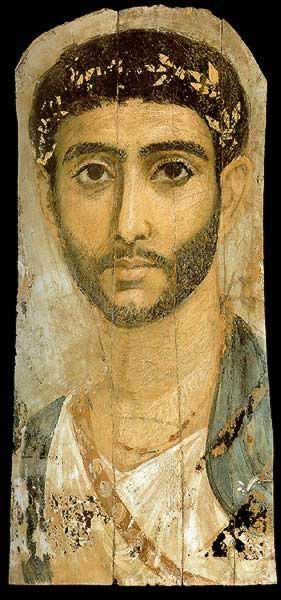
That crown is a symbolic thing, to celebrate your victories in life. It’s not STREET WEAR.
And okay. It’s 40-41 AD. Caligula is emperor. Military chic is in. If you’re a guy, you’re wearing your hair short and un-styled (LIKE AZIRAPHALE.) Those dramatic little spit curls wouldn’t show up until at least Nero.

But actually, pulling back for a second - are you appreciating the absurdity that is this hairstyle? Because it took me a second to notice that only the FRONT HALF is curled.
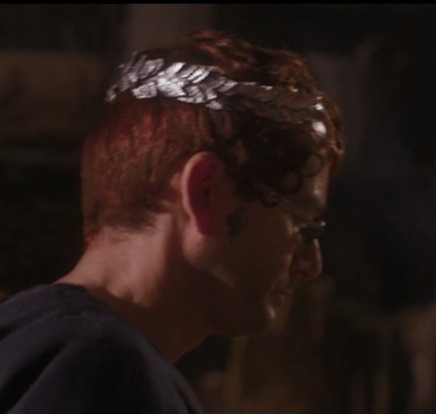
Which is a Roman hairstyle. But it’s a Roman LADY hairstyle.
(It tends to get called ‘Flavian Hair’ because the Flavian era ladies of the 70s-90s got pretty extreme about it, but you still had less… dramatic versions in the 40s.)
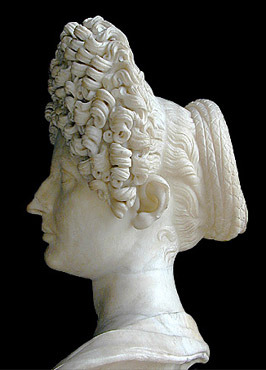
That’s you, Crowley. That’s your style reference. Honestly, if you had just kept your hair long everybody would have thought you were a cool barbarian chieftain or something.
II - CLOTHES
The black is fine. It’s eccentric, but fine. Romans wore black. Wearing black was Cato the Younger’s *thing.* It gets associated with mourning and/or protest, but it would have been really visually confusing to have Crowley wear some other color. This gets a pass.
Nope, my question is about his articles of clothing. There’s a charcoal grey garment that seems to be a toga + undershirt. It’s looped over Crowley’s arm, which is a classic toga give away.
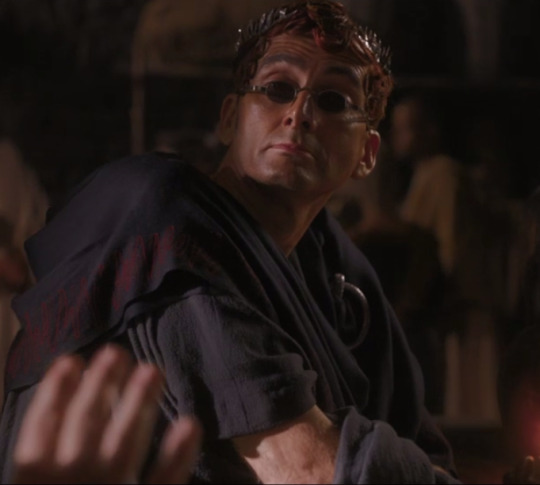
That part’s fine. But over the top, he’s wearing a true black… short cape? Shawl? it’s really hard to tell, because whatever it is, he is NOT wearing it correctly (is it folded in half?) Also, that irregular red zigzag pattern is very strange and I do not recognize it from anywhere. Seriously, I can’t even decide on a continent for this garment.
III - JEWELRY
Emperor Nero usually gets credit for inventing the first sunglasses, after he started watching gladiators fight though a green gemstone. He won’t be emperor for about ten years. But hey, he probably got the idea from somewhere. And dark glasses are just a really sensible way to hide your snakey eyes. This is also the first time we see Crowley put up some proper emotional barriers, so it’s a good place for the glasses to be introduced. (@theladyzephyr has a wonderful meta that goes into a lot more detail here.)
So the sunglasses are good. BUT THAT BROOCH.
Okay. This is Aziraphale wearing a fibula plate brooch

It’s a really Roman style, and a really Roman shape (a “pelta”)

I’ve never seen one that looks like angel wings, but a Roman citizen is going to look at that and see a soppily patriotic Imperial Eagle. How nice that this lovely man from Germania/Greece has made some money and become such an exemplary citizen!
But Crowley is wearing a penannular (pin-and-ring) brooch
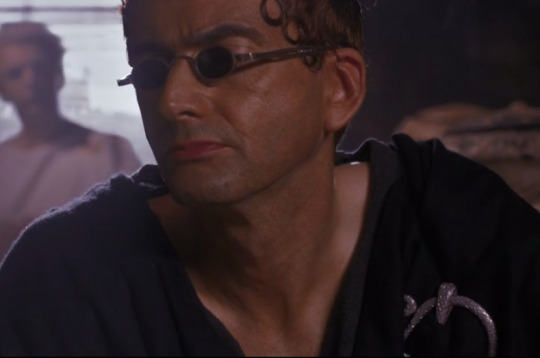
That’s not roman. That’s a style from the British Isles (Irish, Pictish, Scottish, Welsh.) It says barbarian, boonies, outskirts of the civilized world.
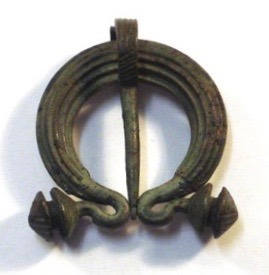
And nobody @ me with pictures of pin-and-ring brooches from Rome. Those are small, cheap, and undecorated. They’re the cultural equivalent of safety pins. This is patterned like a snake, and it’s the size of Crowley’s palm.

AND THAT’S ANOTHER THING. They didn’t do snake-themed jewelry in the British isles. Snakes didn’t have the best cultural associations there, and there weren’t too many of them there to begin with. This isn’t something Crowley picked up because “hey, a snake, cool,” and then got attached too. This must have been commissioned special.
But you know who LOVED snake jewelry?
ROMANS.

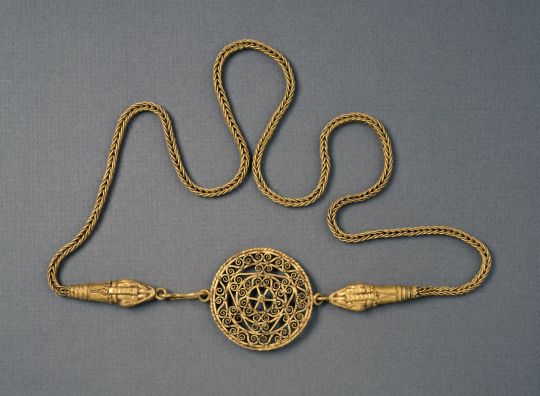
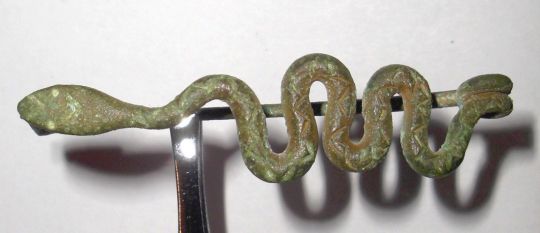
Romans associated snakes with healing and rebirth - clinics sometimes had lil snakes crawling around on the ground to give the place good vibes.
You cannot tell me that Crowley could have existed in Rome for any length of time and not picked up some of this jewelry. Which leads me to my conclusion:
IV - CROWLEY IS EXTREMELY NEW IN TOWN
The unfashionable pin and hair? The clothing draped the wrong way? The cultural colorblindness of wearing a laurel crown when you’re not supposed to? Crowley looks like a tacky tourist because he is one. He’s not staying here long, he “just nipped in for a quick temptation.”
He’s in a bad mod because he’s had an awful day, everyone keeps looking at him funny, the temptation was a complete bust, he has culture shock, and now he’s just trying to get a drink. But they don’t have any PROPER drinks like ALE or MEAD here, so he just orders “whatever’s drinkable.” He’s even not sure what they drink in Rome.
But then Aziraphale shows up and invites him to lunch some place fashionable. So everything’s going to be okay.
50K notes
·
View notes
Text
Very fun and interesting comparative analysis!
How act two of The Sound of Music might foreshadow Good Omens season three ~
I was reading this post about Aziraphale’s ball idea coming from The Sound of Music rather than Jane Austen, and remembered that I’d meant to make a post about parallels between Aziraphale and Maria. The romantic plot of Good Omens has a lot in common with the plot of The Sound of Music, and season two just so happens to leave off at the very end of act one. So, is there a chance that act two could provide some clues about season three? I find the idea very compelling, so here’s my analysis of the movie and how I think it compares to what we’ve seen so far, as well as what we can hope to see in season three.
In the beginning we have Maria at the abbey, where it is made clear that she does not fit in because she has a hard time abiding by the rules. She also has a tendency to prioritize the natural/material world over her spiritual duties, which is represented by the opening song (“The Sound of Music”), the singing of which literally makes her late to return to the abbey. This has obvious parallels to Aziraphale’s difficulties conforming to Heaven’s way of life, as well as his worldly attachments.
(A fun bonus parallel is in the song “Maria,” when the nuns say “she’s always late for everything / except for every meal.” Aziraphale-coded fr.)
Maria leaves the abbey to be the governess to the von Trapp family, and this is where she begins to really learn about herself as an adult outside of a tightly controlled religious environment. She still doesn’t conform to the new world she lives in, but begins learning how to retain her selfhood without feeling ashamed of doing so. This period is obviously a parallel for Aziraphale’s time on Earth—although the time frames are quite different, the same general lessons are learned.
At the end of act one, as addressed in the linked post, there is a ball where the Captain and Maria dance, and this is the moment where Maria discovers her feelings for the Captain. Although this scene is an obvious parallel for the Jane Austen ball scene, I think it’s honestly more similar to the kiss in the final 15. Maria, mid-dance, stares into the Captain’s eyes, freezes, and backs away, saying she can’t remember the dance anymore. The Baroness is watching from the doorway, and when Maria runs upstairs to get changed for dinner, the Baroness follows her.
Up in Maria’s bedroom, the Baroness confronts Maria about her feelings for the Captain, which Maria denies initially. The Baroness convinces her of her own feelings and of the Captain’s, and essentially encourages her to run away—I’ll get into why in a second. Without a word to anyone, Maria returns to the abbey. This is a super obvious parallel to the end of season two, with the Baroness acting almost in the role of the Metatron by pulling Maria aside and reminding her of her “duty.”
Now into the more speculative side of things, trying to think of how The Sound of Music might offer hints as to what’s coming in season three.
When Maria returns to the abbey, she remains in constant silent prayer for the first several days before being called upon by the Abbess. Maria confesses that she ran away because she was frightened, and admits that she had accidentally developed an attraction for the Captain. She gives her reason for not telling the Captain about her feelings and choosing to return the abbey: “I was there on God’s errand. Oh, I couldn’t stay, I just couldn’t. I’m ready at this moment to take my vows.” This sense of misplaced duty might not be all of it, but again, we’ll get to that in a second.
The Abbess responds with probably more kindness than we’d expect from anyone in Heaven: she says that romantic love can be holy, that Maria needs to discover how God intended her to spend her love, and assures her that “if you love this man, it doesn’t mean you love God less.” With this, she commands Maria to return.
While this may seem incongruous with Heaven’s general business model and something unlikely to be paralleled in season three, I think it’s important to think back to the conversation at the end of season one immediately following the failed apocalypse, when Crowley asks, “Angel, what if the Almighty planned it like this, all along? From the very beginning?” People joke about God trying to set them up from the beginning of time, but I don’t know that it necessarily has to be a joke. The question of God’s ineffable plan is a constant throughout the series—the whole point is that it’s impossible to say what exactly God intends.
This is the exact same conflict Maria faces in the scene with the Abbess. When she objects to returning, she says, “But I pledged my life to God, I — I’ve pledged my life to his service.” The Abbess rejects the idea that this is the only possible plan that could have been intended for Maria, saying, “You have to live the life you were born to live.” Perhaps there will be something similar in season three, some way in which God communicates the same thing to Aziraphale—that loving Crowley doesn’t mean loving Her any less, that their love is holy, and that the life he is meant to live is not one pent up behind heavenly walls, but rather out in the world with Crowley.
After Maria returns, she’s reunited with the children, the Captain and the Baroness break off their engagement, lots of little plot things. What I’m interested in is the song “Something Good” (which I would just like to emphasize is sung in a gazebo... anyway). The song introduces an additional reason for Maria’s departure—namely, that she did not feel worthy of the Captain’s love, a sentiment that he returns. They both come to the conclusion, though, that they must have done “something good” to deserve having found each other. Here are some lyrics:
For here you are, standing there, loving me
Whether or not you should
So somewhere in my youth or childhood
I must have done something good.
The basic theme of the song is self forgiveness, and the acknowledgement that past imperfections do not make a person unworthy of being loved. Rather, both characters here have felt themselves to be inadequate, but view the other’s love as a sign that they must, in some way, be good.
I love the idea that Crowley and Aziraphale might have a moment like this, because I think it would be massive in terms of their own self acceptance. For Crowley, Aziraphale’s love (and possibly God’s endorsement?) is proof that his fall did not make him irredeemable, that he remains a being who can love and be loved in return. For Aziraphale, Crowley’s love is an affirmation that he can honestly be forgiven for his transgressions, rather than marked forever by them (like removing the stain from his coat, allowing it to be forgotten).
Unfortunately, the movie does not end with their marriage—they still have to escape Austria after the Captain is called to serve by the Nazis. I think we can assume the Nazis parallel Hell, and say that perhaps Aziraphale and Crowley really will have to establish “their own side.” Maria has to break free of the abbey, and the Captain has to break free of the Nazis. They do this by running away, and I’m not sure Aziraphale and Crowley would ever flee Earth in the wake of the Second Coming, but I will say that it does immediately evoke the idea of the pair running away to Alpha Centauri. I do think that given the “they are bad at their jobs and did very little to seriously prevent Armageddon” joke from season one, it would be a little funny if humanity managed to save itself during a momentary retreat from Aziraphale and Crowley.
I don’t mean to imply that the blueprint of season three is found in act two of The Sound of Music, but I do think that the movie being canonically a favorite of Heaven’s, the recurring theme of the ineffability of God’s plan, and the sheer number of parallels within the plot so far make it a fair place to look for clues. Who’s to say that God’s plan wasn’t hidden in plain sight?
72 notes
·
View notes
Text
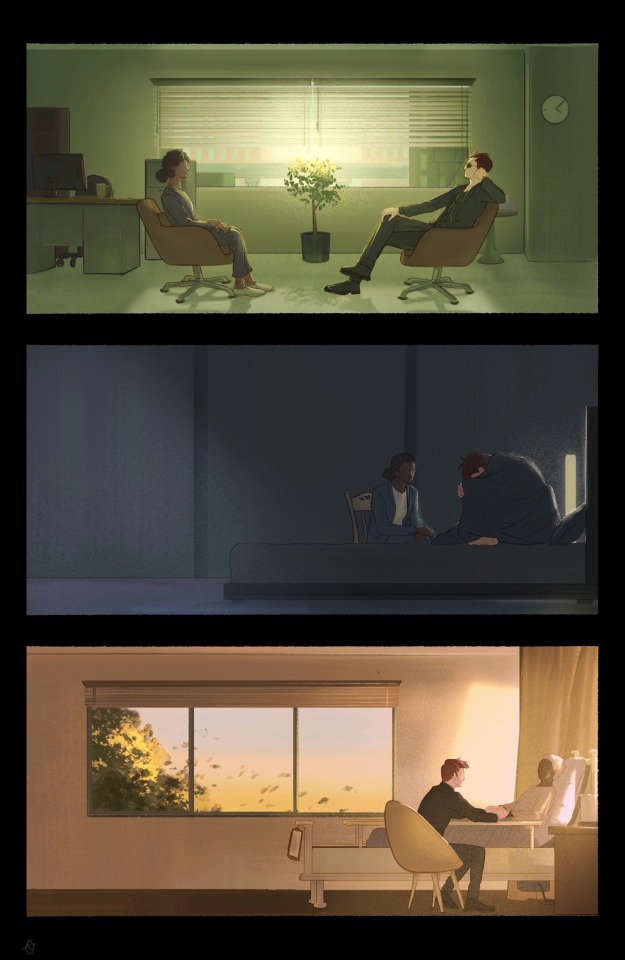
Demonology and the Tri-Phasic Model of Trauma.
The Tri-Phasic model of trauma consists of three healing phases:
1. Safety & Stability
2. Remembering & Grieving
3. Reconnecting & Integration
“She would sit here, with Crowley. She would sit, in compassionate honesty, with him. She would sit with him, for as long as he needed, as long as it took for him to feel safe enough to emerge from his cocoon.”
Inspired by the same name fanfic by Nnm on ao3, you can read it here:
Words cannot describe how much impact this beautiful fan-fiction has on me. It gave me the courage to pick up my own tree, one day it’ll become a forest too, just like Aubrey’s. Thank you.
2K notes
·
View notes
Text
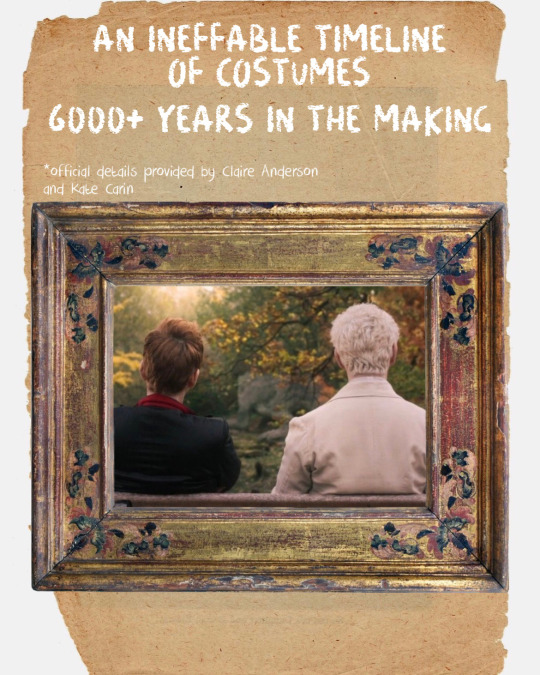




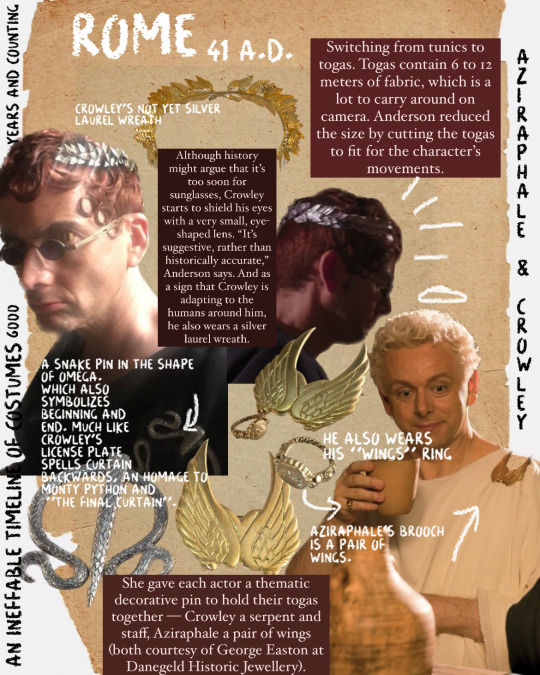


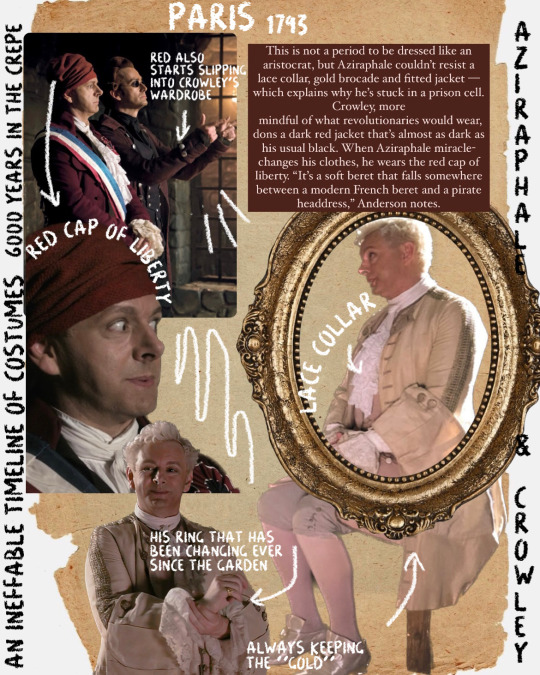

An Ineffable Timeline of costumes:
Where I gathered every official source detailing the costumes for s1 and s2. From interviews with Claire Anderson, lead costume designer for season 1 to Kate Carin, lead for season 2.
Part 1.
And part 2 and part 3. ♥︎
If anything is not mentioned, it’s because there were no “official articles” talking about the costume.
2K notes
·
View notes
Text
Furfur has two photos because he has two cameras


The madness continues I guess? This is Fufur's camera(S) from the x-ray content on Amazon prime. They said it actually worked on the day, which is a little crazy for a few reasons... most notable of which, is that this is not one camera. It's two cameras.
The bottom one is a heavily modified 70's sx-70, probably with a front that has been covered in black pebble grain leather to hide the viewfinder and logos in the front. It's also upside-down, so that the polaroid comes out the top of the camera.
I've drawn the shape hidden inside the steampunk accessories
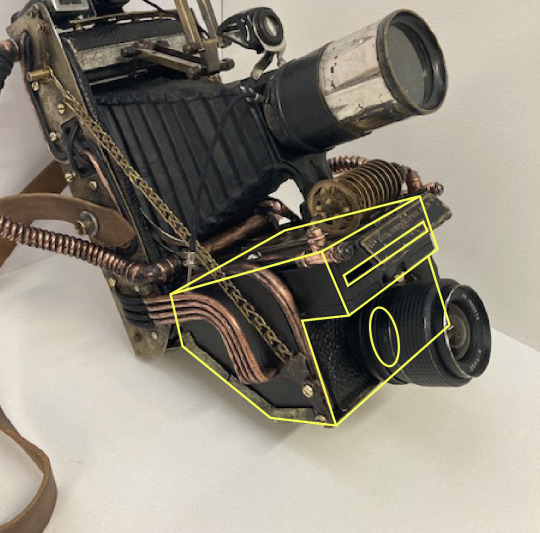


That photo that comes out during this shot is from the sx-70 with the Mirage 28mm macro lens attached to it (lol wtf. That is extremely funny if you know anything about photography).
The second camera is an original 1948 95 model land camera in black. These were originally portait or vertical, aned flipped out with a stand as the cover. Here they've added a barrel lens and taken the front cover stand off.


They've also combined the viewfinders to be up top beside the flash. These older models didn't have an automatic film ejection. You had to rip the film out of the back after opening it. The film was also slightly different sizes than the polaroid you've probably seen before. See below.



The one is Furfur's camera ejection is wider than the smaller, more close up shot in Crowley's hand later in the dressing room. Because the images tracked on to the film in the theatre were 100% done in post (no polaroid film develops that fast), it could just be a small inconsistency. It would make sense. But why go through all the trouble to build a double polaroid camera for Furfur to use?
And if there are two polaroids, where's the other one? And why does Furfur not seem to have it?.
-----------------------------------------------------------------
Thanks to @kimberleyjean @thebluestgreen and @embracing-the-ineffable as always.
187 notes
·
View notes
Text
I watched Staged to heal my heart from Good Omens...

Are you kidding me how many times do we have to watch them break up with a thousand-yard stare into our souls 😭
#good omens#ineffable husbands#aziraphale#crowley#aziracrow#gomens#good omens 2#david tennant#michael sheen#michael and david#staged
320 notes
·
View notes
Text
Time to go read more Blake!
William Blake - an introduction for Good Omens fans
I have sent @neil-gaiman an ask regarding his feelings toward the poet/artist William Blake a couple of times, but no doubt due to the size of the poor man's inbox I haven't received a response. So I did a Google search to see if he's spoken about Blake before, and it did indeed come up with a fair few hits. I think you might enjoy seeing this Twitter post if you haven't already, the painting is from William Blake's illustrations to Paradise Lost.
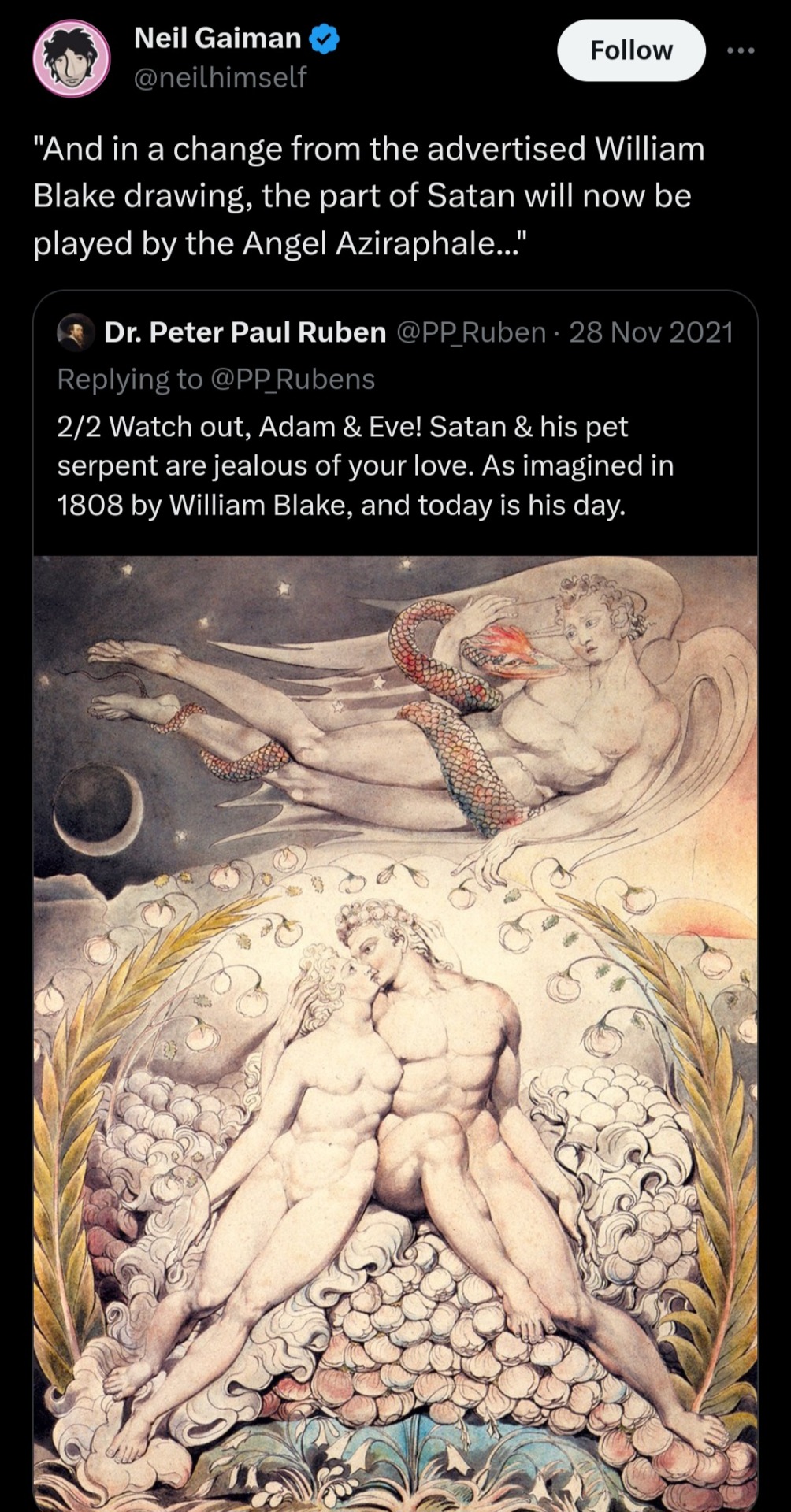
It's not surprising that an author like Neil Gaiman might have an interest in Blake. A visionary from a young age, his imagination was such that he was surrounded by angels made visible in his mind's eye, and he interpreted these visions through poetry, painting and engraving, and self-printed and published many of his own works. This gave him complete freedom to say exactly what he wanted.
Though he had a passionate faith in God, he also had a deep distrust of the church as an institution, and disliked the use of religion as a means of control. This poem from "Songs of Experience" perhaps summarises his feelings best:
"I went to the Garden of Love,
And saw what I never had seen:
A Chapel was built in the midst,
Where I used to play on the green.
And the gates of this Chapel were shut,
And 'Thou shalt not' writ over the door;
So I turn'd to the Garden of Love,
That so many sweet flowers bore.
And I saw it was filled with graves,
And tomb-stones where flowers should be:
And Priests in black gowns, were walking their rounds,
And binding with briars, my joys & desires."
In his poetry there is often an incongruity with the generally accepted religious ideas of what is good and evil, Angel and Demon. In The Marriage of Heaven and Hell (there's a title that should make any GO fan sit up and pay attention) he tells us that "in the book of Job, Milton's Messiah is called Satan", signifying that he feels it is Lucifer/the devil who is the true Messiah of Paradise Lost.
He gives us The Voice of the Devil and Proverbs of Hell, and has Angels being transformed into Demons through enlightenment. He tells us that Jesus broke all of the 10 commandments, yet was still virtuous because he acted according to his own morality rather than rules.
The god-figure of his later works, Urizen, generally comes across as malevolent, seeking to bind and control, whilst Los, the Satan/Messiah figure represents freedom, imagination and creativity.
"Restraining desire" and acting contrary to your own nature seem to be the only real evils for Blake.
He expressed his faith through a love of the world and the beauty in it, summed up in this quote:
"When the Sun rises do you not see a round Disk of fire somewhat like a Guinea? O no no I see an innumerable company of the Heavenly host crying Holy Holy Holy is the Lord God Almighty".
He saw "God" in everything, in all the wonders we have around us, and considered writers/poets and religious prophets as essentially the same, since they both have a connection to the divine, and express it through stories.
It's quite ironic that probably his most famous poem, Jerusalem (the one that starts "and did those feet in ancient times walk upon England's mountains green"), was made into a very popular church hymn, yet it is supposed to be satirical in nature. The poem recounts the myth that Jesus may have visited England in his boyhood, and Blake is expressing his disbelief at that notion and the unworthiness of England.
Did I have a point to all this? Mostly to show my hand as a massive Blake nerd, but also to hopefully demonstrate that there's a lot of common ground between his ideas and those expressed in a show/book like Good Omens, and hopefully to inspire some of you who may not be familiar with Blake to seek him out. In particular I'd recommend The Marriage of Heaven and Hell to any and all.
EDIT: I should have thought to include this, here's Michael Sheen reading a Blake poem. I have the CD this is from, he reads several by Blake, as well as other poets I love ❤️ 😍
youtube
1K notes
·
View notes
Text
Doubt is the Essence of Faith - Questions, Prayer, and Crowley’s Relationship to the Divine
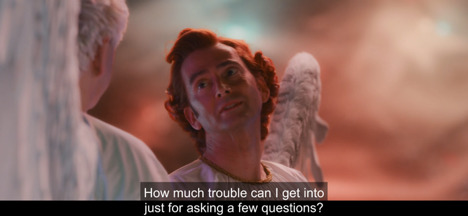
In the novel A Prayer for Owen Meany we meet a flawed pastor named Lewis Merrill who is suffering a crisis of faith. He believes that God has turned away from him due to his sinful thoughts and actions and that he is not worthy of forgiveness. As he silently wrestles with his personal demons, he preaches the most optimistic version of his belief to his congregation: doubt is the essence of faith, and not faith’s opposite.
In Good Omens, we see a similar theme play out throughout the series. While many angels and demons blindly order others or follow orders on the perceived will of the Almighty, it is those who question and who are open to questions who are ultimately closest to God. Let’s delve into the relationship between doubt and the divine, and particularly how Crowley fits into it.
God’s Presence in Good Omens
What do our characters know about God in Good Omens? For a world replete with angels, demons, heaven, hell, Satan, miracles, and nuns, there is comparatively little representation of God as experienced by the characters. (I am not counting the 4th-wall breaking narration from God in Season 1 since that is an audience-only view.) The characters of Good Omens see and hear very little from God, and the status quo is that God is distant, unreachable, unknowable - ineffible. As Crowley says, “There is just God, moving in mysterious ways and not talking to any of us.”
We only know of two instances where the characters hear from God: God speaks to Aziraphale when he leaves the Garden of Eden, and God speaks to Job at the end of his trials. The Metatron claims to be a conduit to God and to speak with Their voice: “To speak to me is to speak to God. I am the voice of the Almighty.” But the Metatron is not necessarily a reliable narrator, and even Aziraphale questions his claim by categorizing him more as a spokesperson. From an audience perspective, the more we see of the Metatron and his manipulative ways, especially when he is underscored by sinister music, the more it seems like he really speaks for himself.

Are You There, God? It's Me, Crowley
If God isn’t generally speaking to our characters, the reverse is also true. Communication is a two-way street and the characters in Good Omens rarely reach out to God. Prayer is conspicuously absent. Angels do not pray, nor do humans who come face-to-face with immortal supernatural beings. The Them, Anathema, Newt, Shadwell, Madame Tracy, the shopkeepers, Maggie, and Nina - not one of them engages in prayer when confronted with a glimpse into a world beyond their mortal sphere or even when facing Armageddon. We do not even see the Satanic nuns, a full on religious order, engaging in prayer to their dark lord and master.
While Aziraphale does not precisely engage in prayer, he does at least try to talk to God in Season 1 when he takes his concerns about Armageddon “all the way to the top.” The whole thing feels rather technical, however - more like a celestial phone call than a cry from his soul to the Almighty. When Aziraphale connects to heaven the exchange feels bureaucratic, beginning with him lodging a complaint about the conduct of Michael and the other angels. He is unable to reach God directly and at the end of the conversation, the Metatron “leaves the line open,” again more like a phone call than a prayer.

There are, however, three characters we see who engage in more traditional prayer. Job is the first character (chronologically speaking) we see speaking to God. Job is “literally God’s favorite human,” so it is unsurprising that he would commune directly. In his case it is unclear if he is actively engaging in prayer or simply receiving messages from God, but given that God starts off by saying “Job, if you have questions for me, I have questions for you,” it seems likely that Job is actively praying.
Jesus is the second character who prays. We briefly see him praying as he is nailed to the cross, entreating the heavens, “Father, please, you have to forgive them.” Again, this is unsurprising - Jesus is the son of God, has a direct relationship with Them, and is traditionally depicted as praying for the forgiveness of humanity while on the cross.
The third character who engages in prayer is… Crowley. In Season 1, Crowley turns his eyes heavenward and directly implores God not to destroy humanity: “Great Plan? God, you listening? Show me a Great Plan. Okay, I know you’re testing them, you said you were going to be testing them. You shouldn’t test them to destruction. Not to the end of the world.”

Crowley’s prayer is noteworthy when compared to what we see from Job and Jesus. For starters, it is significantly more substantial. By Crowley’s generally reticent standards it’s almost a monologue. It is also significant because instead of simply beseeching God, Crowley first questions God, then makes a demand, then suggests an alternative to what he believes God’s plan to be. Out of everyone we see speaking to God, Crowley has the most interaction and is also the one who approaches Them most like an equal.
In a second small example of prayer, Crowley says a quick “oh, God” under his breath in the confession scene after Aziraphale makes his heartbreakingly naive statement: “If I’m in charge, I can make a difference.” Here Crowley is subconsciously reaching out to God in his deepest moment of need, readying himself to try to salvage the future he sees going off the rails. He is the only main character we ever see directly reach out to God in distress.
Dangerous Questions
The characters within Good Omens share a common conviction that God is not to be challenged or questioned. In Season 1, Aziraphale is repeatedly told not to challenge God’s will via the Great Plan - after all, the war is to be won, not to be avoided. In Season 2 at the creation of the universe we see Aziraphale cautioning Crowley not to ask questions or make suggestions because it could get him into trouble. The baseline assumption is that doubting or questioning God can remove you from Their grace. Even Crowley believes that he was cast away from God because he asked too many questions. “That’s just how it started for me,” he tells Aziraphale in Job’s cellar as Aziraphale begins to question his blind loyalty to a God that would kill children. “See you in hell!”
It is also made clear that the angels and demons in charge of heaven and hell are not personally a fan of questions. In Season 2 we see the Metatron brooking no challenges from the archangels and sneering at Crowley’s history of “always asking damn fool questions.” In hell, Shax’s response to Eric’s repeated challenges and questions at the kick-off before the bookshop attack is to destroy him. Both heaven and hell are in the business of control - they give orders and expect obedience. Asking or answering questions only undermines their position of authority and control. But fallen angels, angels, and even the Metatron are not God and do not necessarily share God’s perspective.

Divine Questions
All evidence we have indicates that God actually loves questions. They sound delighted that Job has questions for Them, and They are definitely in the business of asking questions of the mortals They speak to. In fact, almost every statement we hear God make is in the form of a question. When They speak to Aziraphale, They say:
“Where is the flaming sword I gave you, Aziraphale, to guard the gate of Eden?”
And Their conversation with Job is almost entirely made up of questions:
“Do you know how I created the Earth? Where were you when I laid the foundations of the Earth, Job? Were you there when all the morning stars sang together and all the Angels shouted for joy? Do you know the rules of the Heavens? Did you set the constellations in the sky? Can you send lightening bolts and get them to report back to you? Did you give wings to peacocks, Job, or teach the ostrich to run?”

And interestingly enough, God is not the only divine entity to communicate through questions. When Satan appears at the end of Season 1, his dialogue is also almost entirely made up of questions:
“Where is my son? You? You’re my rebellious son? Come here. What? What did you say?
(As a fascinating side note, when asked a question about God in Good Omens on Tumblr, Neil Gaiman responded entirely with questions: “Does God know everything in this universe? Does God act on what God sees? Does God tolerate the behavior of her creatures?”)
In each of these examples we see that far from God being averse to questions, the act of questioning is integral to the divine. It is part of the process that God engages in when trying to make a connection. Job, as God’s favorite, is tacitly given permission to ask questions. Blind obedience is apparently not what is demanded - some measure of doubt, of questioning, is required to arrive at a sincere faith and relationship with God.
Crowley’s Relationship to the Divine
So how does Crowley fit into this? Crowley is a questioner at heart. From the beginning we see him asking hard questions. Standing on the wall of the Garden of Eden he immediately doubts the foundational actions he and Aziraphale have taken: “It’d be funny if we both got it wrong, eh? If I did the good thing and you did the bad one?” At Noah’s ark he peppers Aziraphale with questions about God’s intent, at the crucifixion he wonders what Jesus did to get everyone so upset, in King Arthur’s time he questions the value of what he and Aziraphale are doing as they cancel each other out, and on and on. Throughout this questioning he has little patience with the idea that the answers are unknowable. “Are you going to say ‘ineffable?’” he asks Aziraphale, witheringly, as he watches the Ark be loaded.
When it comes to his relationship with God, it’s clear that Crowley has many unresolved issues, particularly around the trauma of his fall and his separation from God's love. As many other people smarter than me have pointed out, his entire approach to plant care is simply a replay of his own trauma: identifying a flaw in a plant, expressing his personal disappointment in his role as houseplant God, holding it up as an example to its friends, destroying it/casting it out of its home, and threatening the remaining plants with the same fate if they don’t grow better. The bookshop fire is also experienced by him as a replay of his fall - the loss of someone he loves deeply, the fire itself, and even a physical fall when he is shot by a jet of water - that leads him to immediately get drunk and remember what it felt like to do a “million light-year freestyle dive into a pool of burning sulfur.” Crowley relives his trauma over and over.
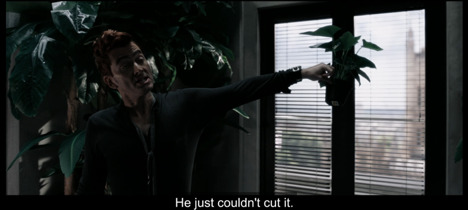
As a result of this unresolved trauma, Crowley can have difficulty acknowledging the reality of his fall and his status as a demon. Sometimes he downplays the fall itself (“I didn’t really fall, I just, you know, sauntered vaguely downwards”) as well as his responsibility for it (“I just hung around the wrong people;” “All I ever did was ask questions”). From our first introduction to him he does not behave as other demons do, responding to a ritualistic demonic greeting of “All hail Satan” with an unenthusiastic, “Uh, hi, guys.” He deliberately distances himself from hell by describing himself as “going along with hell as far as he can.” And perhaps most significantly he sets himself apart from other demons with his love for the earth, its creatures, its people, and all the lovely, clever things they invent.
Just as Crowley has never fully embraced and integrated his transformation into a demon, he has also never fully abandoned his subconscious associations as a former angel. When we first meet him as an angel in heaven at the start of Season 2, we learn that he is architecting the universe by creating nebulas, stars, and proto-planets and see the pride and love he holds for his creations. When things get tough on Earth and Armageddon approaches, his immediate thought is to return to the vast reaches of space to see Alpha Centauri or one of the nebulae he helped build, the last place where he felt a part of creation rather than of destruction. Similarly, when Aziraphale forces Crowley into action at the airbase in Season 1, Crowley’s primal instinct is to stop time and transport himself, Aziraphale, and Adam to a place that looks remarkably like the featureless white of heaven. In a callback to his previous life as an angel, he then uses the crank from the Bentley to restart time the same way he used a crank to start the engine of the star factory (perhaps even the same crank). He is even still sensitive to blasphemy, chiding Aziraphale for saying “oh my God!” and is clearly awed by and envious of the sight of Job speaking with God. “Just to be able to ask the question,” he says, wistfully.
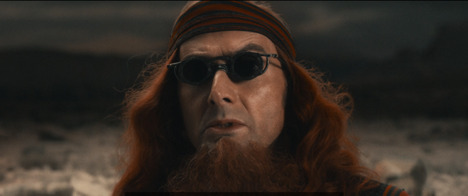
All of these interactions indicate that Crowley is not at peace with his current station, continuing to straddle a space in between angel and demon while wrestling with his past trauma. While there are times that Crowley leans hard into being a demon, he has many unresolved issues and doubts regarding his past life as an angel, the reality and meaning of his fall, and exactly what kind of demon he is now.
The Divinity of Doubt
So where does all this lead us as we enter Season 3? Crowley’s willingness to engage in direct prayer shows he is still subconsciously close to God. More than that, his propensity to constantly ask questions mirrors God’s behavior even more than God’s special favorites, Job and Jesus. Rather than being distanced from God by a tendency to ask questions, the available evidence points to questioning as being integral to a divine connection.
If anyone is to make a direct connection with God in Season 3, I predict it will be Crowley. His doubting, questioning nature is likely to be critical to the healing of his past trauma and the completion of his character arc. I would not be surprised to see Crowley get the opportunity “just to be able to ask the question” of God even if no direct answers are forthcoming. If doubt is the essence of faith, Crowley is well situated to to recover his - whatever that looks like for him - through the course of the final season.
#good omens#crowley#good omens 2#good omens meta#gomens#essay#long reads#good omens season 2#good omens s2
160 notes
·
View notes
Text
Side thought - Crowley living in his car
As I was writing my last piece about the end of S2 through Aziraphale’s eyes, I kept getting distracted by the moment when Aziraphale learns that Crowley has been living in his car. (Neil Gaiman confirmed that Aziraphale didn’t know.)
In this moment Aziraphale is still reeling from Gabriel and Beelzebub going off together so I don’t think he’s processing this piece of information just yet, but I would imagine him returning to this in his mind as one of many things that he dwells on and questions in retrospect. I can’t stop thinking of what that will be like for him when it hits him.

Wait - Crowley was living in his car?

Why didn’t he tell me?
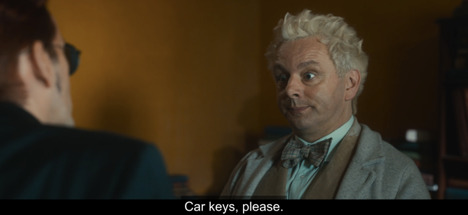
He could have stayed here. I would have offered… wouldn’t I?

When the bookshop burned down he immediately offered that I could stay with him.
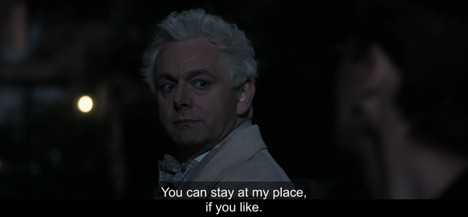
Except… remember when he asked to stay with me during the lockdown and I turned him down?
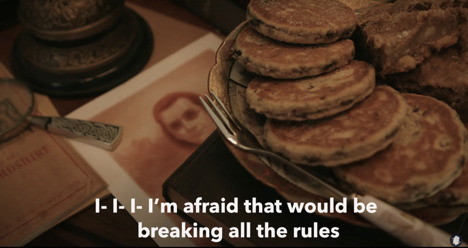
Did he think I wouldn’t have offered if he’d told me?

I would have… right?
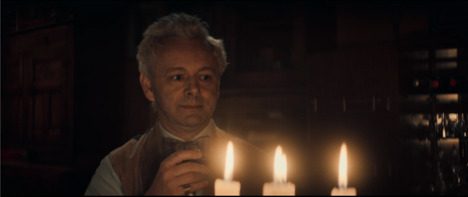
83 notes
·
View notes
Text
Why we won't have an Apology Dance in S3--or, why I'm choosing to start WW3
Much as I love the Apology Dance, I have a hunch that neither Crowley nor Aziraphale will perform it in S3. It's such a weird (affectionate) little mating ritual, and I cannot see it without thinking of David Attenborough's "Birds of Paradise" clip from Our Planet. (The little fuckers really get going around the 2:30 mark, if you're interested.)
youtube
S2 demonstrates so many of these bizarre little mating rituals. Specifically, I'm thinking about the "Don't hesitate to ask me if you have any questions" moment...

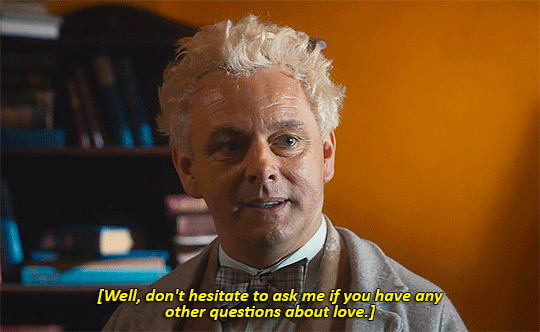
...I mean, Goddamn. Someone damn it. Aziraphale is about to climb that demon like a tree.
And the exchange about borrowing the Bentley...
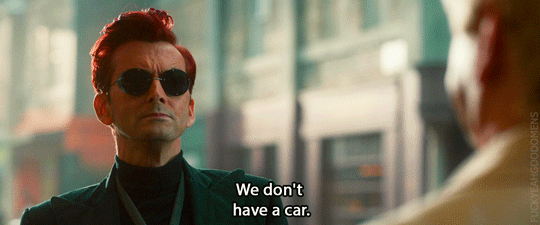
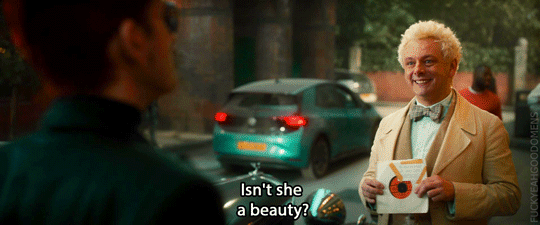
...which is a battle lost before it's even begun because Aziraphale flashes those pretty eyes and Crowley's too smitten to really put up a fight.
Mah point is (dolphins). My point is that every aspect of their interaction, particularly in S2, is a dance, a courting practice, a mating ritual to which only these two weird (affectionate) little birds know the steps.
And the Apology Dance is one of the key steps in this ritual. We know how important it is because Aziraphale has memorized each year when he performed it for Crowley. 1650, 1793, 1941... And Crowley has now reciprocated. But for all the importance of the Apology Dance, we never hear an actual apology. The words, "I'm sorry" are never exchanged between the Ineffables.
Of course, Aziraphale has forgiven Crowley on multiple occasions (have a tissue), but the absolution is never in response to an apology.
Why does this matter, you ask? Because Crowley has never asked to be forgiven. It's one of his self-identifying traits.

And every time Aziraphale offers him forgiveness, it calls into question Crowley's whole identity. I think this is why Crowley initially refuses to do the dance. He doesn't "do the dance," because he doesn't apologize. Because what's the point? If you believe yourself to be beyond forgiveness, why even bother with an apology.
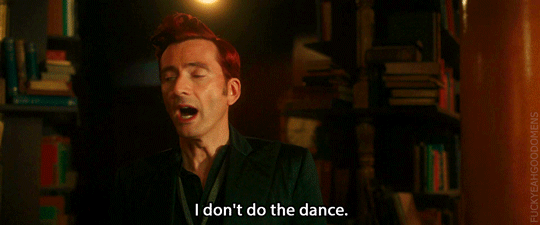
But that's not what's most interesting to me. See, outside of mending his relationship with Aziraphale, I don't think the demon could give a single fuck about forgiveness. On the cosmic level, it's just another carrot dangled by Heaven. The whole concept of forgiveness of sins demonstrates a pretty fucked up power differential. I mean, who gets to decide whether God has forgiven you when She's not even talking?
I think it's fascinating that despite their squabble, Crowley removes his glasses the moment he steps back into the bookshop, performing the Apology Dance in his "naked" face. It suggests that he knows before he even starts that everything is going to be okay. He can approach the situation in a state of vulnerability because he deeply trusts his angel. But the dance, the mating ritual, still has to be completed. It's similar to how Aziraphale knew Crowley would let him drive the Bentley, but they still had to negotiate their way through the motions.
We've called it the Apology Dance, despite the fact that no apology is offered and no forgiveness given. Remember, Aziraphale's response to Crowley's successful completion of the ritual is, "Very nice."
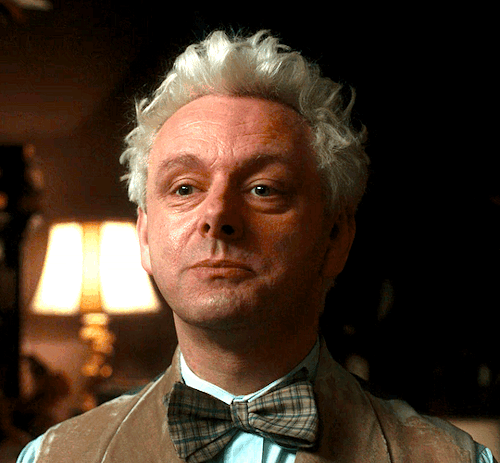
So here's the crux. All these rituals that they perform, the Ineffable dances, if you will, rely on one crucial element. The result of the ritual has to be established before the ritual has begun. They each have to enter the ritual in a state of vulnerability, knowing the outcome will be safe and satisfying. And I think that's why Aziraphale doesn't say, "I forgive you" after Crowley's elegant spin and bow.

Because forgiveness is something Aziraphale only offers the demon when he feels cornered, frightened and unsafe. Think about the two times he's said it. In both cases, the forgiveness was weaponized.

(Apology Dance incoming for this next gif.)

In a very real way, when Aziraphale forgives Crowley, he invalidates his best friend's lived experience. Crowley doesn't want to be forgiven. He wants to be accepted. Loved. Seen.
So as much fun as it is to speculate about who might dance for whom in S3, I truly hope neither angel nor demon apologize to the other. For me, the most meaningful conclusion would be for them to complete their mating ritual not with some dogmatic, pedantic, fucked up power differential where one forgives the other for perceived iniquities. Nah. Fuck that. I want them to accept and love and deeply see one another and fully embrace whatever that means.
Here. Have some tissues.

384 notes
·
View notes
Text
Good Omens Fandom! I’m a teacher so making visuals is my jam. May I present: The Ineffable Timeline :)

5K notes
·
View notes
